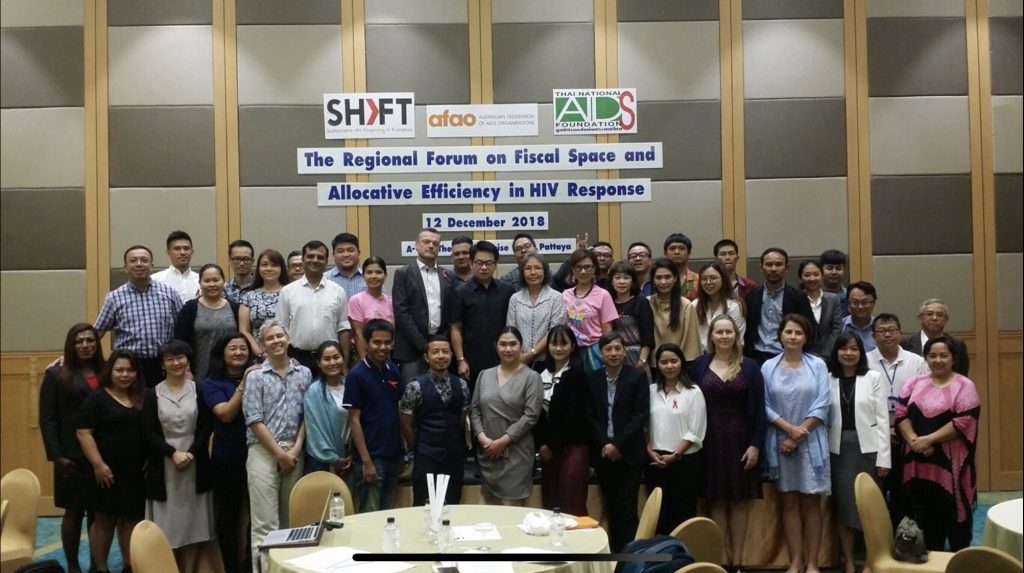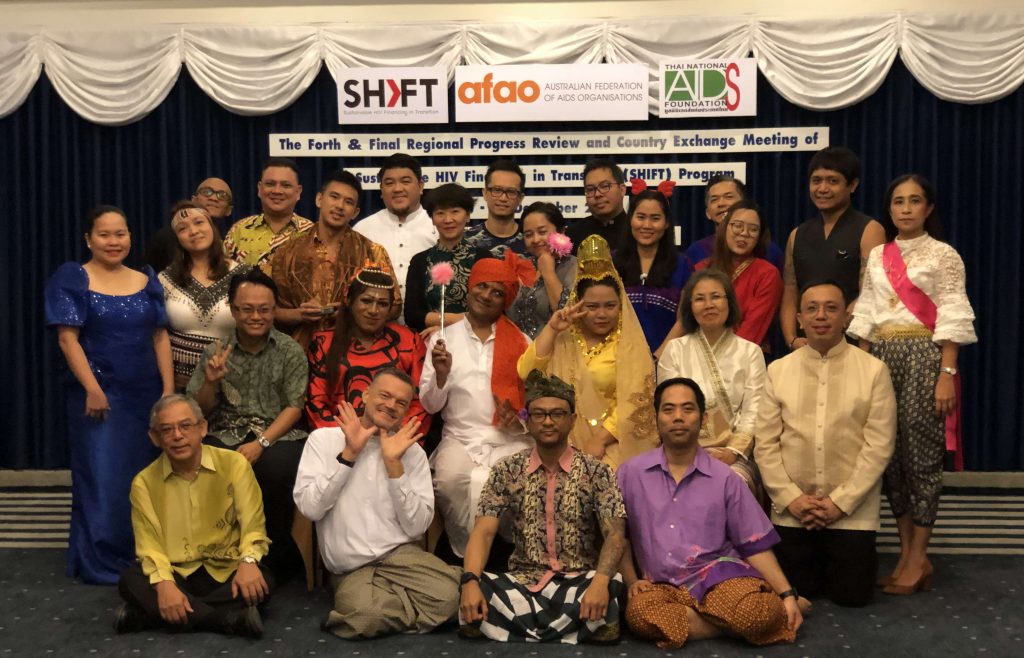Pattaya, Thailand
12-14 December 2018
The Sustainable HIV Financing in Transition (SHIFT) Program organized its fourth and final regional forum on HIV financing in Pattaya on the 12th of December. Hosted by SHIFT Country Partner the Thai National AIDS Foundation (TNAF), the forum saw the participation of country partners across the 4 SHIFT countries: IAC, TNAF, ACHIEVE, MAC and regional partners, AFAO and APCOM. In addition, Global Fund CCM members, Thailand Department of Disease Control, National Health Security Office, as well as UNAIDS, UNDP, APN+, APNSW, YouthLead, SWING, SISTERS and OZONE.
This forum was organized under the SHIFT Program and is a response to the pressing need to engage HIV financing sustainability especially in light of the forecasted decline of international funding and a transition out of international donor support. Aiming to facilitate discussions on new insights and updates on the community response to advocate for sustainability, the specific theme of this forum was fiscal space and allocative efficiency in the HIV response.
Notable presentations included an overview of how to adequately address fiscal space and allocative efficiency challenges delivered by Dr. Khin Cho from the UNAIDS Asia-Pacific Regional Support Team Data Hu), as well experiences on budgetary space and allocative efficiency by Dr. Kantinun Rungthanadhada (Thai National Health Security Office) and Ms. Wannarat Makamnoed (Department of Disease Control, Ministry of Public Health). Representatives from each country also provided an update of their progress under the SHIFT program and discussed implementation challenges, solutions, and the road forward in a panel discussion. A key objective of the forum is to encourage cross-country learning and knowledge sharing.
The regional forum preceded 2 days of the SHIFT’s Program’s Final Progress Review. The forum provided an opportunity to discuss experiences and insights of the implementation of various projects related to domestic HIV financing, CSO funding mechanisms, financing sustainability and CSO leadership across the 4 SHIFT countries. Independent Consultant, Pascal Tanguay, presented on the preliminary findings of the SHIFT Program’s end line evaluation.
Indonesian AIDS Coalition SHIFT Budget Advocacy Coordinator, Panji Hilmansyah, “The SHIFT Program has been instrumental in helping communities increase their understanding of HIV financing. This is crucial to ensure more effective lobbying of national governments to increase HIV funding for vulnerable communities.”
Australian Federation of AIDS Organizations SHIFT Technical Advisor, Greg Grey: “SHIFT has been an exciting new project for the Asian HIV response, and we have been privileged to see country partners use this project to help communities advocate for needed allocation of resources. We are sad to see the SHIFT program ending but are looking forward to incorporating elements of sustainable HIV financing into the next multicounty Global Fund grant, Sustainability of HIV Services for Key Populations (SKPA) Program, that AFAO will be leading”.
What is SHIFT Program?
For those who are not familiar, SHIFT has been a 2-year Global Fund program focusing on four priority countries: Indonesia, Malaysia, Philippines and Thailand. The program works towards a sustainable, cost-effective and strategically allocated funding for HIV in transition countries, that ensures active participation and coverage for key populations and civil society organizations. It puts centre-stage the civil society and key population response. People living with HIV (PLHIV), men who have sex with men (MSM), people who use drugs (PWID), sex workers (SW), transgender people (TG), young KP and gender perspectives are prioritized in its engagement with transitional HIV financing.
What is the SKPA Program?
The SHIFT Program, which ends in January 2019, will be followed by AFAO’s Sustainability of HIV Services for Key Populations (SKPA) Program, supported by a 3-year Global Fund multi-country grant. The SKPA Program aims to promote sustainable services for key populations at scale to stop HIV transmissions and AIDS-related deaths by 2030 and will be implemented in Bhutan, Lao PDR, Malaysia, Mongolia, Papua New Guinea, the Philippines, Sri Lanka and Timor-Leste.

Regional and country SHIFT speaking at a panel discussing implementation challenges and solutions on Fiscal Space and Allocative Efficiency and the road forward.

Participants from the SHIFT Forum on Fiscal Space and Allocative Efficiency in the HIV response

Participants from the SHIFT Fourth & Final Progress Review and Country Exchange Meeting

